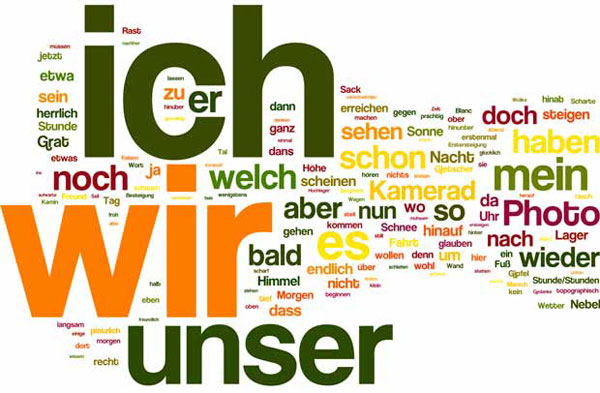The question of how to learn German independently and quickly, many of our readers ask. I hasten to please you: anyone can learn a language without outside help, but it is still more difficult to do this than with a teacher or assistant. And the point here is not at all that someone will put everything in order for you and give you the finished result, it’s just that most people, no matter how trivial it may sound, do not have sufficient self-discipline to study anything on their own. And of course, it is impossible to give everyone a general recipe, because each person is an individual, each has his own character, his own psychological characteristics. Some have a good memory, and some not so much; some have an ear for music, while others have the most ordinary one. And that’s good, thank God we are not robots yet.
But still, despite all our wonderful differences, There are ways to learn a language on your own. I have long been planning to generalize them in relation to the German language, but somehow I never got around to it. The impetus was given by a letter from Alexander that recently arrived at our site. The letter is very short, but very succinct. Here is his text:
I watch, read, listen, but I have no results, the misunderstanding grows even stronger.
I decided to answer with an open letter:
Hello, Alexander! Thank you very much for your letter. Similar messages come to us quite regularly. You did not write what language you are studying, but judging by our correspondence, it is German. However, your situation is quite typical for beginners learning any language, especially on their own. Confusion in the head is the brain's response to any new information. This is normal - our brain, especially with age, becomes more inert and tries to move along a well-established track, to use information that is already recorded in memory. It’s simpler, less expensive, and there are objective reasons for this related to the structure of our thinking apparatus (but we won’t delve into the jungle of neuropsychology now). You need to take this calmly: you shouldn’t dramatize, much less be frightened by this circumstance; instead, ask yourself 2 simple questions: do I need a language, and if I need it, why? If you can easily answer these questions, then it makes sense to continue.
If there are no answers, most likely nothing will work out and it may be better to quit right away. However, options are possible here too, but more on that later.
At the very beginning of independent language learning everything seems simple: the alphabet, letters, words, articles, simple phrases. Then phrases turn into sentences, sentences become longer, more complex, grammar, irregular verbs, genitives with accusatives, declensions, subjects, predicates and other parts of the sentence are improved. All this begins to mix and turn into an unimaginable mess in the head. At this stage, many people who do not have the correct psychological attitude simply stop and give up, or greatly slow down, learning the language. Well, that’s right, it means they don’t really need him. But how can those who really want to know the language overcome this barrier, this wall of misunderstanding? To continue, as mentioned above, you need serious motivation or severe self-discipline. Yes, it is perseverance and discipline that will help those who have not yet completely decided on their goal.
By the way, the most successful people are those who know how to properly manage their time, their plans and, last but not least, their brain. And proper control means it works with full efficiency and without overload. Many detailed, intelligent and thick books have been written about this, but the most accessible and popular, despite some simplifications, is David Rock’s book “The Brain. Instructions for Use.”
But let's return to the language. What follows are days, and sometimes nights, of painstaking work, the main thing in which is not even grammar, vocabulary, phonetics or syntax, but language practice. What is practice? First of all, this is listening, that is, the ability to understand foreign speech by ear. You need to listen a lot, constantly, even if nothing is clear yet. And if we're in in this case We’re talking about German, then the brain should be filled with the German language, it should make you feel sick and slightly nauseous. Over time, this feeling will pass, and the language will become your favorite, almost native, and will even begin to bring you pleasure.
At the same time, you need to start talking, also a lot and persistently, without being afraid of difficulties and pronunciation errors. The more you listen to German speech, and the more you train your speech apparatus, the easier it will be for you to speak, and your pronunciation will improve day by day.
Writing while learning a language highly desirable. Keep your dictionary in a notebook, write cards, do written translations, write an essay or summary based on the text. You have to write by hand, which uses motor memory, which, although indirectly, helps us remember words.
Sequence of study may be different, but logic dictates that it is best to start with the alphabet. Knowing the sequence and pronunciation of letters, it will be easier for us to read and write, find words in the dictionary and navigate alphabetical lists. Then we put the letters into words that complete our lexicon, at the same time we put in pronunciation and study grammar. If it seems to you that you personally don’t need grammar, try working with a phrasebook and immediately memorizing ready-made phrases, there is a rational grain in this, because when we speak Russian, we don’t remember the rules, but simply give out memorized phrases. But in the process of learning a language, I strongly recommend at least looking at the grammar and finding answers to questions that arise. Once you learn to speak German fluently, you can forget about grammar.
Numerals are of great importance in any modern language, since we encounter numbers and figures at every step, so it is very important to thoroughly learn German numerals (they are also in the phrasebook). And, of course, you need to listen to German speech a lot and repeat, repeat, repeat, as small children do. This is the only way you can speak German.
But at some stage of learning a language it begins to seem to us that we know and can do something, and suddenly we meet with a native speaker or listen to live, not adapted foreign speech on TV, radio, on the Internet, and from what we hear almost nothing we do not understand. It turns out that native speakers speak quickly, indistinctly, and do not try at all reprimand for us words, swallow letters and even entire syllables, construct incorrect sentences, use slang and local expressions. Outrageous!
You can, of course, begin to be indignant, or you can simply try to speak with a native speaker over a glass of beer, for example, at Oktoberfest in Munich, and if this is not possible, then find a German studying Russian and communicate with him in German online. In our age digital technologies there are no problems with this, and there may be many options, however, the main driving force still remains the person himself, his perseverance and ability to work, manage himself, his time, and his ability to competently and rationally use his brain.
Which of us has not complained about our memory at least once in our lives? “I can’t pronounce this word! And even more so to learn…” - how often have you personally said something similar? I admit, I often do.
What about learning a foreign language? Is it possible to remember a large number of new foreign words and grammatical rules without having an excellent memory? Yes. And you can do this in two ways:
1. By ordinary cramming. Works. Verified. But there is a big disadvantage to this method: it requires a lot of time and patience.
2. With mnemonics. I will say right away: we are not talking about a newfangled direction in the study of foreign languages. Mnemonics is an old method that allows you to remember any information faster and easier.
What is mnemonics?
Let's take a look at Wikipedia. This is how the popular electronic encyclopedia interprets this strange word: “ Mnemonics (mnemonics)- a set of special techniques and methods that facilitate the memorization of necessary information and increase memory capacity through the formation of associations (connections).”
Simply put, mnemonics are ways that help you remember the necessary information.
Moreover, any: telephone numbers or dates, first and last names, foreign words. Mnemonic methods are based on a very obvious fact: it is difficult for a person to remember letters, numbers and other symbols that mean nothing to him. It is much easier to retain vivid pictures in memory.
Well, tell me, for God’s sake, how can I remember a set of 15 numbers? These are just signs that don’t mean anything to me personally! Of course, if I regularly repeat these numbers, the result will appear, but this takes time and patience. In addition, “memorized” information that is not used is forgotten very quickly.
Now let's try to replace the numbers with bright pictures. For example, the number 2 is very similar to a swan, so every time you need to remember the 2, imagine a swan. The number 8 is a bit like a nesting doll, and 1 is like a pencil. Thus, in order to remember the numbers 281, we need to imagine a swan, a nesting doll and a pencil, and they must interact with each other. For example, a swan swims across a lake, grabs a sunken pencil with its beak and begins to draw a matryoshka doll on land. Isn't it true that such a mini-story will be remembered better than just 281?
I gave an example with numbers only so that you understand the essence of mnemonics. But, of course, you are interested in How this method will help you learn German.
How to learn German using mnemonics?
Learn foreign language(including German) means remembering a huge amount of new information: foreign words, grammatical rules. And, in general, for a beginner it is no easier to do this than to remember a set of the same numbers or, say, hieroglyphs. Really, what's the difference? Mnemonics can simplify the task. Using mnemonics you can learn:
- words;
- some grammatical rules, namely:
- articles
- forms of irregular verbs
- prepositions
- verb management
- declension of adjectives
How to learn German words?
New German words can be memorized using the keyword method. This method is very simple and consists of the following: for a German word you need to select a keyword from your native language that will sound similar to it.
For example, you need to remember the word Brille, which means glasses. Let's use the keyword method. To do this we take several steps:
- We are looking for a keyword. To do this, close your eyes and repeat the word Brille several times. What word from the Russian language does it remind you of? It seems to me very similar to “diamond”. This word will be our key word.
- Let's imagine the situation. This means you need to come up with a mini-story in which the keyword (in our case, diamond) and the translation word (in our case, glasses) will interact.
For example: You were given a gift of unheard-of generosity: GLASSES, but not ordinary or even gold, but DIAMOND. More precisely, instead of glass there are two huge diamonds. Wow!
- Mentally create a picture(it will be called mnemonic picture), which reflects an imaginary situation. Visualize these diamond glasses, imagine them in detail. What kind of frame will they have? What will the diamonds look like? Beautiful, isn't it? For example, my diamond glasses look like this:

Sometimes, finding a keyword for a new German word is absolutely no problem. For example, the German word Tier (animal) extremely similar to Russian word « shooting gallery" We apply the mnemonic method described above and get the following mnemonic picture and a situation for it:

Situation: You enjoy visiting the shooting range and shooting at the drawn ANIMALS. You are against killing animals!
I already foresee skepticism from some readers. “But there are not many such similar words!” or “I don’t have such a good imagination to invent keywords and stories!”
And I understand you very well! Indeed, there are not many words that are similar to Russian. But it has been proven in practice: most often we only need to remember initial letter or the first syllable of a word, in order to name the entire word. Surely, you have had this happen: someone suggests the first two letters of a word, and you instantly remember the entire word. For example: You can't remember the word Löffel (spoon). It's on the tip of your tongue. “Well, how is this... Lu... Le...”, - and the teacher tells you “Lö...”, and you joyfully substitute the last syllable “A-ah, Lö-ffel!”
Remember, you don't need to search for a keyword with an absolute sound similarity!
The main thing is that it is for you REMINDED about that new word that you want to remember! For example, for Löffel I selected the keyword “löffa” or “Löva”. I know there is no word “löffa” in the Russian language, but little children could easily say something similar.
Regarding doubts on the topic of fantasy, I will say the following: searching for keywords will indeed require a little creativity. But I think each of us is capable of imagining a little.
How to learn articles?
Most of those who learn German consider articles to be the most difficult topic. Indeed, how can you remember the gender of a noun? The word “milk” in German is feminine (that is, “she”), and “girl” is neuter (that is, “it”). Why? Fair question. But, unfortunately, we will not receive an answer to it. But we can make it easier for ourselves to remember articles.
There are several mnemonic ways to remember German articles. I talked about them in detail in. Now we will consider only one way.
Paired memorization method
Let's figure out what the point of this method is, without touching on the topic of articles for now. Imagine that you need to remember one pair of words: TV - table.
- Link words together. We will do this with the help of the following sentence: I see a huge table on which there is a TV.
- Visualize the proposal. This means you need to come up with something for it a bright picture. Imagine a very concrete table and TV.
How to use the method for German articles?
In fact, a German noun and an article are also 2 words. Only one of them - the article - is impossible to imagine in a picture, because it doesn't make any sense.
Our task- replace the article with a word-image that is understandable to us.
Let's choose images for articles:
- Der- the article is masculine, which means we need to replace it with an image that we associate with masculinity. It could be strong man or lion.
- Die- feminine article. What do you associate with femininity? Most likely, this will be the image of a fragile girl.
- Das- neuter article. Finding an image for this article is a little more difficult. Let it be something neutral, something that does not remind us of the masculine or feminine gender. For example, the sea.
Your task: learn the gender of the noun Glas (glass). The word is neuter.
We take the following steps:
- Replacement. We replace the article das with a symbolic image - the image of the sea.
- Relationship. We build a relationship between the words glass - sea using the sentence: a glass floats in the sea.
- Visualization. We present the situation in a picture.
“Will mnemonics help me personally?”
You are probably wondering whether mnemonics are suitable for everyone? And, most importantly, will it help you personally? The answer is: mnemonics works for everyone! However, under 3 conditions:
- You should initially have a positive attitude towards mnemonic methods. Statements like “They come up with all sorts of methods there” or “You just need to cram the language” will not help you. The position should be something like this: “Interesting! This is a must try. Something will definitely help!”
- You must study the methods carefully and thoughtfully. It is important to understand how mnemonics work.
- You need to put mnemonics into practice! It’s not enough to read, you have to try it!
- “yes” - 10 people
- “most likely yes” - 12 people
- “no” - 3 people
- “probably not” - 1 person
- “I don’t know, I haven’t tried it” - 6 people.
As you can see, the vast majority say that mnemonics work!
And in conclusion, I would like to remind you, dear readers, of one indisputable fact: any information that you remember must be put into practice! Have you learned the words? Great! Make up sentences with them, use them in your letters and, of course, in conversation! This is the only way you can learn a language!
Good luck in learning German!
August
2016
I think that first, so that interest in the language does not disappear, it is worth starting with materials that are entertaining and educational at the same time. In this regard, I can advise you this:
1. German is a language that immediately begins with difficulties. The difficulty with this is the articles that determine the gender of the noun, and it - this gender - in German most often does not coincide with Russian (the most famous example here is "das Mädchen" - a girl, which is neuter in German; the article das indicates the gender, and there are also der and die + indefinite ein and eine). So you either have to stupidly memorize ALL the nouns along with the articles that belong to them, or use the game "Der-Die-Das", and it is an excellent tool for memorizing articles (and for replenishing your vocabulary, by the way, too), since they are there divided into simple, medium and complex. Don't ignore this game.
Well, I’ll allow myself a little self-promotion) I once wrote short fairy tales on German grammar, and they were published on the de-online website. One of these tales is “How Nastya freed articles.” People liked it) Read it, maybe it will somehow help you in learning articles.
5. There is also a good audio course for beginners: "Deutsch - Warum nicht?": consisting of four episodes, it tells the story of student journalist Andreas and his invisible companion Ex. Each series includes 26 lessons with dialogues, exercises and audio materials. There are textbooks for this course (one for each series), which are downloaded separately.
6. As for textbooks, in addition to the already mentioned “German Grammar with a Human Face” (a textbook with pure theory, no exercises), I can recommend V.V. Yartsev’s textbook “German Grammar? Don’t be afraid!”: it has a very interesting, humorous presentation of the material in the form of a journey through the forest through different clearings. Exercises are provided for each section, and answers to them are given at the end of the textbook.
7. To memorize irregular verbs - the song "Die Poetischen Verben": these verbs are sung there in rhyme, thanks to which they are perfectly remembered. There are 40 irregular verbs in this song - that's just the beginning.
8. To remember some prepositions - a poem by A. Khotimsky "
To answer this question, you first need to understand why you need German, i.e. formulate a goal for yourself. This is important because It’s one thing to learn a language for the purpose of communicating with native speakers while on tourist trips, such as asking for directions, finding out the price, making an order in a restaurant, shopping in stores, etc. And it’s another thing to read Goethe or Zweig in the original, or get higher education in Germany, understand lectures, prepare for seminars and exams, etc. Or conduct business correspondence with German partners, make business trips to Germany for the purpose of training at enterprises. Agree, the tasks are completely different. Based on these tasks, your training will be structured differently.
Thus, we select first step:
1. Statement of the purpose of study
So, let's say you set a goal. You clearly understand why you need German. What's next? And then begins something without which any learning becomes simply impossible: desire or, scientifically speaking, motivation. Unfortunately, not even the best teacher will give you this magic pill that will stimulate you every time you “suddenly” get a headache and decide to cancel the lesson. No one will learn words for you, do homework, learn boring grammar rules. Unfortunately, for most people, an attempt to learn a language (no matter what) remains an attempt. The most persistent and stubborn ones reach the “finish line” (you can believe me!). Therefore, immediately, from the first lesson, you set yourself up for work, because learning a language is also work.
You may have to temporarily forget about your habits, hobbies (or better yet, make German your hobby!). For some, hanging motivational slogans everywhere: in the apartment, on the desktop helps. It is useful to immediately make some acquaintances with native speakers on social networks (it helps someone to find a lover from Germany). Maybe someone around you is learning the language? Great, then there will be someone to exchange experiences with. In a word, all means are good! You have to immerse yourself in the language. Let these be mini-notes with words on the refrigerator (on the topic “Food”), in the bathroom (on the topic “Morning Toilet”), etc. Play German radio in the background, get used to the melody and rhythm of the German language. Train yourself to think in German.

Remember, the beginning is always difficult, you just need to get through this stage. But then a second wind will open, and all sorts of “goodies” will begin in the form of the opportunity to say something about yourself, understand simple questions from your interlocutor, and read short texts.
So we do the second one, and probably the most important step:
2. Creating and fueling motivation
Why did I write “recharge”? Because nothing helps you progress in a language like regularity. I’m always in favor of devoting a little bit to the language every day, rather than sitting down and trying to do your homework in one sitting or feverishly remembering what we covered in the last lesson? There is no need to try to learn 300 irregular German verbs at once; it is better to make it a rule to learn, for example, 10 words every day. This is the most optimal amount, and after a few months you will have a fairly decent vocabulary. Again, don't pause too long in studying. This is especially true during vacation or holidays. Everything flies out very quickly! And then remembering everything is long and painful. You can use the time you spend commuting to the office. Get a small pocket notebook (dictionary) and leaf through it when you are stuck in a traffic jam or in line. Or install a language learning program on your phone, such as Duolingo. In short, make the most of your free time.

By the way, I am not a supporter of blind and thoughtless learning of new words. They will be layered and over time replaced by other new words from memory. Try to somehow emotionally color new words for yourself.
As you know, information is best remembered if you use several senses at once. First you see this word, then you say it out loud, then you write it and listen to it somewhere on an audio medium. Those. It is important to write and say new words out loud. It is good to learn adjectives in pairs - with an antonym. With verbs, it is useful to immediately try to build short sentences. This way you will remember the verb and how it is used (conjugated) in speech.

Another important point: very often people (especially at the beginning of studying) are afraid/embarrassed to speak. Some people are afraid of making a mistake, others don’t like their own pronunciation, etc. Because of language barrier people compare themselves to a dog that understands everything but cannot say anything. My advice to you: don’t be afraid to speak up and make mistakes! After all, the goal of any communication is to be understood by your interlocutor. If this happens, then the goal has been achieved. Of course, I want to speak correctly and without mistakes. I want to formulate my thoughts beautifully and complexly. But it's the same as asking one year old child run a hundred meters against the clock. When you start learning a language, you are like a child learning to walk. He will certainly fall and get up again and again. In this regard, parents help him in the beginning. Therefore, it is very important that you, too, have someone to guide and help you at the beginning of learning a language. Therefore we do third important step:
3. Choosing courses or tutor
It all depends on you: whether you like to study in groups or whether you prefer an individual approach. Each method has its own pros and cons, which I think is not worth listing. Learning a language on your own is quite difficult (unless you are a person of iron discipline and self-organization). Although it must be said that there are now a huge number of different resources on the Internet for learning the German language: from Dmitry Petrov’s online lessons to a variety of tutorials. But practice shows that people first try to learn the language themselves, but then they still choose courses or turn to a tutor.

So, the choice is made. You regularly attend classes, do your homework, but the desired progress is not observed. It is important to understand here that if you do something regularly, progress will come sooner or later. Yes, you won’t be able to speak fluently right away. By the way, a foreign language takes, on average, three years to learn. Despite the fact that no one has canceled your main activities and urgent matters! At first, you will have to write a lot, get acquainted with boring grammar, learn words, and do a bunch of (seemingly) monotonous exercises. When grammar becomes automatic and a decent vocabulary has accumulated, you will be able to formulate your thoughts on your own. What can I advise you at this stage, when you really want to speak, but “can’t” yet? And it will be ours next step:

4. Surrounding yourself with language
I wrote above about the importance of immersing yourself in a language from the very beginning of learning it. This could be German television, Deutsche Welle programs with different news reading rates for different levels of proficiency. Youtube has a variety of mini-series for German language learners. It is not necessary to immediately start with news channels, try watching German entertainment channels, for example, pro7, rtl, rtl2, sat1, vox, start with everyday topics. You can also watch German cartoons or films with subtitles in German. Get used to speech, try to isolate individual unfamiliar words and write them down.
It is useful to read short texts or books adapted for different levels, and even less useful to retell these texts. This develops speech, you learn ready-made constructions, which you can then use in conversation, but you should not overuse ready-made models. Sometimes many people think that having learned a dozen speech patterns, they can get by in all situations in life. Of course, like any language, German has its own set expressions that can really only be “understood and forgiven.” But language is still more than fixed expressions.

We learn poems and songs. Why not? Some people actually learned German from Rammstein alone. Kidding. By the way, you can show off your knowledge of the poetry of Goethe or Schiller on occasion, showing yourself to be an educated and intelligent person, or impress a girl. ;)
We make acquaintances with native speakers, visit language clubs, of which there are a great many in Moscow now.
Having already gained a good base, you can continue your studies abroad, and it is better to live with some German family and forget your native language for a while. Immersion in the environment and language is guaranteed. The only negative is that all this is not cheap.

Remember, nothing should be neglected in learning a language. It’s trite, but in the toilet room you can also hang notes with words, and above the desk in your room, in general, I recommend hanging a poster with basic grammar tables and diagrams: it’s convenient and you can always double-check yourself. Moreover, it is also better to make the poster yourself: once again write down the basic rules/endings/declensions/prepositions once again definitely won't hurt.
A journey of a thousand miles always begins with the first step. Take this step now!
Learning German is a lot of work. Don’t believe the loud titles of articles and courses on the Internet and the media called “German in 3 months”, “Learn German quickly” or “How to become a polyglot without making any effort”. This does not happen in nature.
The process of learning German is always full of difficulties. Most likely, you will step over yourself through clenched teeth many times, memorizing the next dozen unknowns german words written in the dictionary for the next lesson.
Moreover, the teacher will most likely check this whole matter scrupulously, look at you sternly, at best say “okay” and, most likely, next time he will ask at least the same amount.
It’s paradoxical that we started an article about how to speed up learning German in exactly this way. But in our German courses via Skype, we never tell our students that it will be easy.
People who promise high results without equal effort on the part of both the student and the teacher most likely simply do not know what they are talking about.

But at the same time, we can promise that studying with us will be interesting, exciting, and that you will master the German language much faster. We will be happy to share some of the techniques on how to speed up learning the German language, as well as make the learning process more interesting, in this article.
For some, the advice below may seem unusual and unexpected. Yes, about many indeed useful things teachers prefer not to spread information, giving out information “bit by bit” to their students after they pay money.
But people will turn to us in any case, since no techniques aimed at speeding up or diversifying the study of the German language can replace a good tutor. But first things first.
1. Find the “right” guy or girl
This is one of the most effective ways combine business with pleasure. To master the German language faster, you need to interact with it as often as possible. The best way to do this is to surround yourself with German-speaking people who don’t know Russian at all and won’t let you relax even for a minute.
And a true language enthusiast should not pay any attention to the rest. Moreover, 98% of people on the planet constantly talk to themselves. After all, our internal dialogue does not stop for a moment.
We constantly prove something to ourselves, affirm and retell it. As they say in Tibetan Buddhism, the mind of an ordinary person is a raging elephant, which is extremely difficult to tame. Imagine what will happen if you direct this colossal energy in the right direction!

If you regularly, loudly and clearly talk out loud to yourself, then, firstly, you will very quickly get used to your language. Many people find it difficult to speak German to others simply because they are afraid of how their speech will sound to others. They get lost, confused and make many more mistakes than if they did the same decisively and without fear.
But after talking to yourself a little, you will soon realize that not everything is as bad as it seems. Your speech is very good, considering that you are just in the process of learning German. From this moment on, your speaking skill will begin to improve at a completely different speed.

In addition, speaking in a foreign language always involves some other muscles of the face and oral cavity, which in the process of communicating only in one’s own native language are not used. To develop them, you need to exercise regularly.
When you think in German, you activate a large layer of previously learned vocabulary. And then at the right time Right words themselves will “be” during a conversation with other people. Most of us think much more than we say. By integrating this aspect of your life with the German language, the learning process will go faster.
5. Memorize films in German
Is this the first time you have heard such “instruction”? In fact, memorizing phrases from movies, TV series, TV shows, books and songs is much more effective than simply cramming unfamiliar words written in a dictionary. Indeed, in this case, all the vocabulary contained in the phrases learned in this way immediately becomes active.
If this is your favorite movie, then along with the lines you will probably remember the context within which the words were spoken, and even the facial expressions of the characters. Associative memory will be fully involved. Thus, it will not be at all difficult to obtain from the subconscious at the right moment the necessary combination of words and phrases.
But effectively learning a film in German is also a whole science. We recommend the following sequence of actions:
- Choose your favorite German-language film.
- Watch it first with subtitles and then without them.
- Download the movie script from the Internet and then print it out.
- Read the script and highlight any words that seem unfamiliar to you.
- Learn these words.
- Watch the film again, reading everything the characters say along the way.
- Break the script into scenes and begin to gradually learn it from memory.
Memorizing a movie is no more difficult than memorizing 300 unfamiliar words from a dictionary. But this is a much more exciting activity. Moreover, it will allow you to literally speak German “on the fly”. This is an extremely effective, fast and also very fun way of learning.

We hope you take advantage of these powerful tips to speed up your German language learning as efficiently as possible. But do not forget that they do not replace classes with a teacher, but only complement them.
Perhaps someone will tell you that you can quickly learn a language without a teacher, by studying diligently alone. Of course, it is possible to achieve some progress through persistent independent study.
But learning German on your own, and doing it quickly, is simply impossible. An experienced teacher will always correct the student in a timely manner so that the mistakes he makes in pronunciation and writing of words and sentences do not become a habit.
Besides, good teacher will offer the shortest path to mastering the German language, based on the student’s abilities.
By signing up for classes with one of them, you can be sure that your learning process will be led by real professionals in their field. We recommend you try it. Moreover, our trial lesson is completely free.



